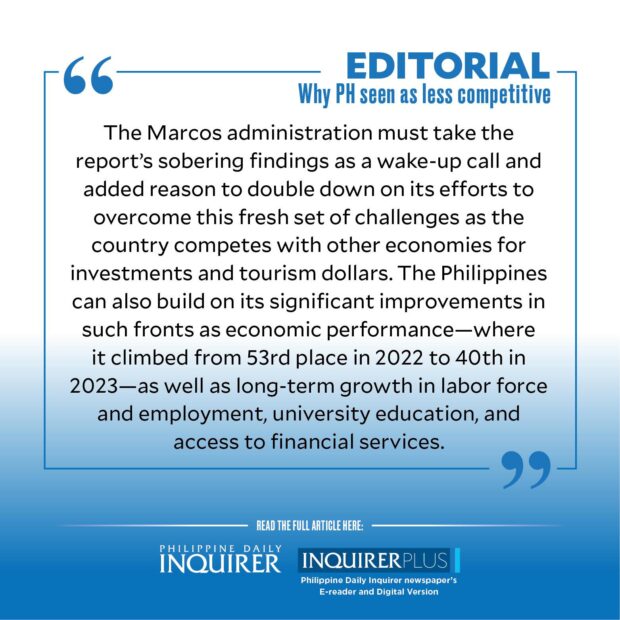Why PH seen as less competitive

People singing hosannas to the Philippines being “in a good place” after overcoming the worst of the COVID-19 pandemic got a stinging reality check this week, when the Switzerland-based International Institute for Management Development (IMD) reported the country’s slide to 52nd spot in the world’s competitiveness ranking this year.
The drop from 48th place in 2022 was traced mainly to the deterioration in exchange rate stability and tourism receipts, on top of a faster inflation rate. The lower ranking means the Philippines remains the second least competitive country among 14 economies in Asia-Pacific, an unwanted distinction that the country has unfortunately held for six straight years.
The ranking was based on how the Philippines stacked up in 255 criteria spread across four main competitiveness factors — economic performance, government efficiency, business efficiency, and infrastructure — which are used by the IMD’s World Competitiveness Center (WCC) in rating each economy covered by its annual study.
The slump in the Philippines’ 2023 ranking in the 35th edition of the closely watched IMD scorecard puts the country far behind neighbors Singapore — ranked the most competitive economy in Southeast Asia and 4th overall among 64 rated economies — Malaysia (27th), Thailand (30th), and Indonesia (34th).
The IMD noted that “clear winners and losers are emerging from a combination of political, economic, and social events of global reach,” including the war in Ukraine and the global rise in the prices of basic commodities.
Sadly, the Philippines’ tumble in competitiveness ranking puts into sharp focus the challenges that lay ahead for the Marcos administration if it wants the country to catch up with its neighbors. As shown by the IMD report, the country recorded drops in three of the four major dimensions of competitiveness that, in turn, indicate the quality of life in an economy
The steepest decline was seen in government efficiency, which covers tax policy, public finance, and business legislation. Government efficiency was shown to have deteriorated for five straight years. The report also found that the Philippines did not perform well in education, health and environment, and basic infrastructure, just some of the consequences of having one of the longest and most stringent lockdowns during the COVID-19 pandemic.
But even more massive challenges lay ahead, as underscored by the Asian Institute of Management (AIM) Rizalino S. Navarro Policy Center for Competitiveness, IMD’s local partner that helped put together the Philippine country report.
“Some of the challenges that the Philippines faces in 2023 include sustaining economic recovery and growth momentum amid global downside risks, strengthening social protection and health-care systems for inclusive development, addressing learning gaps to improve [the] local education system, investing in sustainable infrastructure to reduce climate change vulnerability, and reinforcing efficient public management strategies to support fiscal responsibility,” the AIM said in a statement.
The Marcos administration must take the report’s sobering findings as a wake-up call and added reason to double down on its efforts to overcome this fresh set of challenges as the country competes with other economies for investments and tourism dollars. The Philippines can also build on its significant improvements in such fronts as economic performance—where it climbed from 53rd place in 2022 to 40th in 2023—as well as long-term growth in labor force and employment, university education, and access to financial services.
Filipinos can also take heart from the feedback generated by an extensive executive opinion survey, which said that the Philippine economy was attractive mainly because of its skilled workforce, open and positive attitudes, dynamism of the economy, high educational attainment, and cost competitiveness. These key strengths can be harnessed while the government and its partners in the private sector and the academe work together in areas where the Philippines scored lower compared to other countries.
The Marcos administration can take its cue as well from the most competitive nations—Denmark, Ireland, Switzerland, and Europe as a whole—and strengthen public institutions and its education system, factors that set apart the top-ranked countries from cellar dwellers. Ireland, Iceland, and Bahrain, for example, were noted for their governments’ quick adoption of national policies based on changing economic conditions.
Given the perceived risks of a global economic recession, stubborn inflationary pressures, and geopolitical conflicts weighing down business confidence levels, the Philippines has to be more agile and nimble enough to respond to disruptions that will inevitably crop up. A major determinant of a country’s improved performance, according to IMD professor and WCC director Arturo Bris, is its ability to generate prosperity for its people.




















